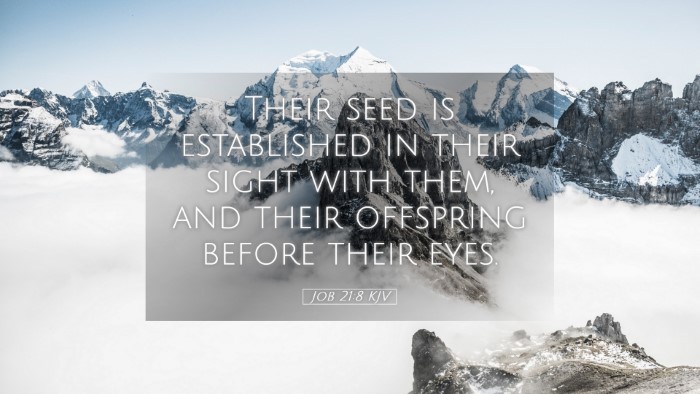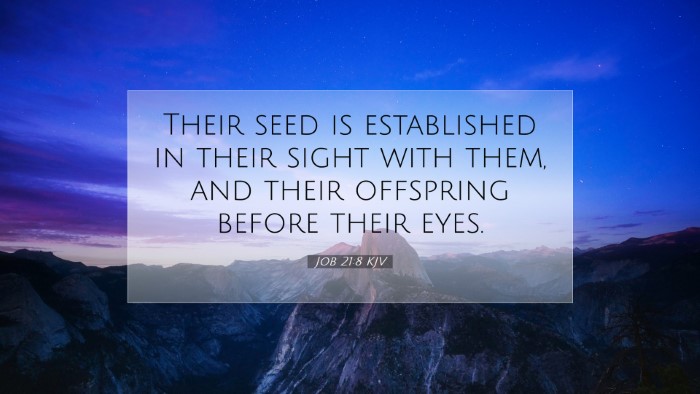Commentary on Job 21:8
Verse: "Their seed is established in their sight with them, and their offspring before their eyes."
Introduction
This verse presents a key insight into the theological discussion regarding the prosperity of the wicked and the suffering of the righteous. Job, in response to his friends’ assertions about divine retribution, articulates a powerful argument that contradicts their simplistic view of justice. This commentary gathers insights from public domain sources like Matthew Henry, Albert Barnes, and Adam Clarke, aiming to provide a comprehensive yet succinct understanding of this verse for pastors, students, theologians, and Bible scholars.
Contextual Background
Job chapter 21 marks a pivotal moment in the dialogue between Job and his friends, particularly amidst their insistence that suffering directly correlates with sin. Job’s lament and his questioning of divine justice lead him to highlight the actual experiences of the wicked. This chapter seeks to demonstrate how, contrary to the friends’ claims, the wicked often flourish, raising profound questions about the nature of God and justice.
Literary Structure
- A. Job's Response
- B. The Prosperity of the Wicked
- C. A Challenge to Conventional Wisdom
Theological Insights
1. The Prosperity of the Wicked
Job asserts that the wicked often see their progeny established and thriving. According to Matthew Henry, this prosperity is a major argument against the theological stance of his friends, who maintain that suffering is a direct result of personal sin. Henry notes that Job does not deny the eventual decline of the wicked; rather, he underscores that in the present, their life can reflect bounty.
2. Evidence of Divine Justice
Albert Barnes elaborates that the observation of the prosperity of the wicked complicates the simplistic notion of divine justice. He remarks that the success and establishment of the wicked in this life raises existential questions regarding God’s governance of the world. Are the righteous always rewarded while the wicked are punished? Barnes affirms that sometimes appearances can be deceiving; for God’s justice is often delayed.
3. The Role of Offspring
Adam Clarke emphasizes the significance of offspring in this verse. Children, their success, and the way they are perceived by their parents symbolize continuation and inheritance—material blessings that often characterize the lives of the wicked. Clarke regards this as an illustration that divine justice in human affairs might not be as straightforward as posited by Job’s companions, thereby challenging the doctrine of retributive justice.
Practical Applications
This exploration of Job 21:8 has profound implications for contemporary readers:
- A. Understanding Suffering: Recognizing that suffering is not always a direct correlation of sin can provide comfort to those experiencing hardship.
- B. The Nature of God: Engaging with the idea that God's justice may manifest in different ways warns against hasty judgments about divine favor and retribution.
- C. Compassion for the Fallen: The acknowledgment of seeming prosperity among the wicked calls believers to reach out with compassion rather than condemnation.
Conclusion
In Job 21:8, the assertion regarding the established seed of the wicked serves as a critical reflection on the dynamics of justice within God's creation. By piecing together insights from Matthew Henry, Albert Barnes, and Adam Clarke, readers can appreciate the nuanced theological challenges presented in the text. For modern believers, this verse is a poignant reminder that appearances can be deceptive and that God’s ultimate justice transcends human understanding.


